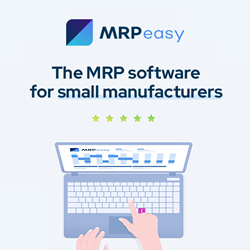Artificial Intelligence: Mitigating Inflation in the Manufacturing Industry

Throughout the years, the manufacturing industry has proven itself to be incredibly resilient, withstanding a wide range of challenges. From navigating the increasingly complex labyrinth of global trade regulations to weathering economic storms, adapting to escalating environmental issues, and embracing the era of Industry 4.0 with its array of opportunities and challenges — the industry has remained steadfast. Now, a new challenge has resurfaced: extreme inflation is wreaking havoc on the entire supply chain. This mounting pressure is not merely another obstacle to be overcome, but it risks destabilising the fundamental economics of manufacturing enterprises globally. Yet, as with all challenges, there lies an opportunity for innovation and the development of revolutionary solutions. One such solution taking centre stage is the integration of artificial intelligence (AI) technologies into manufacturing software and processes.
In this blog article, we delve into how AI can counteract inflation, offering robust solutions to the complex challenges of today's manufacturing industry.
Inflation: The Achilles’ Heel of The Manufacturing Industry
Inflation has been dominating the news headlines for some time now and the manufacturing industry has been captured and tested by this economic phenomenon. Its recent rapid acceleration has brought it to the forefront of the manufacturing industry's collective concern. Rising energy prices, ballooning material costs, and an ever-increasing cost of living have added significant layers of complexity to an already intricate manufacturing ecosystem. In the end of 2022 until early 2023, inflation surged to its highest level in 40 years, registering an inflation rate ranging between 9 and 11 percent in many parts of the world. While this rate is slowly in decline again, the aftermath is expected to linger for the foreseeable future.
As a result, the cost of energy, specifically electricity, a fundamental component in any manufacturing process, has been steadily increasing. This price surge was particularly noticeable during the past winter months and could be attributed to several factors. Political unrest in oil and energy-producing regions, along with environmental changes and regulations advocating for cleaner yet often more expensive energy alternatives, have all contributed to this trend. Given that energy prices tend to fluctuate over the course of a year and with the causative factors remaining relevant, it is essentials to incorporate these energy costs into the future forecasting and cost planning for manufacturing operation.
Simultaneously, material costs, another crucial component of the manufacturing cost structure, are on an upward trajectory. Global supply chain disruptions, escalating raw material prices, and mounting logistics expenses all contribute to this trend. Manufacturers, especially those reliant on international suppliers, are finding it increasingly challenging to maintain a steady production flow without compromising their profit margins. Additionally, higher inflation also leads to increased interest rates, which can further add to the cost of production.
Amid these challenging circumstances, artificial intelligence has surfaced as a beacon of innovation, offering a promising solution to assist manufacturers in steering their way through these volatile times.
The Answer Lies Within Artificial Intelligence
Artificial Intelligence can provide robust solutions to mitigate the negative effects of inflation on energy bills, material costs, and beyond. The key lies in enhancing efficiency and catalysing significant cost savings. AI can enhance overall operational efficiency by streamlining processes and eliminating wasteful practices. It achieves this by learning from historical data and making recommendations for optimal operational practices. For example, AI can suggest more efficient routes for in-factory logistics or recommend better machine utilisation strategies that result in lower energy consumption.
Energy cost reduction
Looking at energy management, one of the game-changing applications of AI is the implementation of smart energy systems. These systems use AI to optimise energy usage, monitor energy consumption in real-time, and make automated adjustments to operations to enhance energy efficiency. For instance, AI can orchestrate machine operations to run during off-peak energy tariff hours, thereby reducing energy costs. The role of AI in extends even further by integrating renewable energy sources. By predicting weather patterns, AI can optimise the use of solar or wind energy, thereby reducing reliance on more expensive and environmentally harmful energy sources.
Fighting increasing material costs
As the costs of materials continue to rise, manufacturers are facing an uphill battle to keep production costs under control as well. Artificial intelligence is capable of providing innovative solutions for managing these costs and even reduce it.
One of the key advantages of AI lies in its ability to optimise supply chains. Through predictive analytics, AI algorithms can forecast demand with greater accuracy, allowing manufacturers to plan their inventory more efficiently. This not only reduces storage costs but also minimises waste from unused materials. Furthermore, AI can assist in identifying alternate suppliers or raw materials that could offer cost advantages without compromising quality.
AI also proves valuable in minimising material waste during the production process. Advanced machine learning algorithms can analyse production data to identify patterns and anomalies. This information can then be used to optimise processes and machinery, leading to more efficient use of materials and less waste. Additionally, AI can aid in the complex logistics of material transportation. AI tools can design optimal routing strategies, considering factors such as fuel costs, traffic patterns, and delivery timelines. This results in not only reduced transportation costs but also faster and more reliable delivery of materials.
Higher Costs of Living Influencing Manufacturers
Inflation impacts more than material, production, and energy costs - it significantly influences the labour market as well. A higher cost of living naturally triggers increased wage demands from employees, a reality that manufacturers must contend with. To attract and retain skilled workers - an existing challenge in itself - businesses are obliged to raise wages. However, this wage increase further escalates overhead costs, thereby exerting additional pressure on profits.
AI can play a role in improving production efficiency, thereby reducing per-unit costs. For instance, AI-powered automation can take over repetitive, time-consuming tasks, freeing up human workers to focus on more complex and value-adding activities. This not only results in higher productivity but can also improve the quality of work life for employees. AI can also assist in the predictive analysis of market trends, enabling manufacturers to make strategic decisions about product pricing and sales strategies. This advanced insight can help manufacturers stay competitive in the market, even when faced with the necessity of wage increases.
Another powerful advantage of AI lies in its capacity for product innovation. AI algorithms can help in the design and development of new products or refine existing ones, often leading to improved functionality or reduced production costs. Such product innovations can drive sales, helping to offset the increased costs of production. With this, manufacturers can tailor their products and services to the specific needs of their customers. This personalisation can command higher prices, helping to offset the impact of the higher cost of living on the manufacturing process.
By leveraging the capabilities of AI, manufacturers can successfully navigate the challenges posed by a higher cost of living. They can maintain - and even improve - productivity levels, keep their prices competitive, and continue to deliver high-quality products. In this sense, AI is not just a tool but a strategic partner, guiding manufacturers through the current economic landscape.
Elisa IndustrIQ: Frontrunners of AI-enhanced Manufacturing
As a leading provider of intelligent manufacturing solutions, Elisa IndustrIQ has innovatively incorporated AI and machine learning into industrial manufacturing software. Tapping into these advanced technologies allows Elisa IndustrIQ to proactively address the pressing consequences of inflation and increasing costs. The transformative potential of AI in the manufacturing sector's approach to inflation is both evident and compelling. It offers robust solutions for energy management, promising significant reductions in energy consumption. It mitigates high material costs through efficient supply chain optimisation, waste reduction, and logistics management. Furthermore, it provides strategies to adapt to higher living costs by enhancing productivity and fostering product innovation.
The integration of AI is more than a strategic choice; it is a pathway towards sustainable, efficient, and resilient manufacturing in an era of inflation. As a pioneering software provider in the manufacturing sector, Elisa IndustrIQ is committed to helping manufacturers harness the power of AI to not just weather the inflation storm but emerge stronger and more competitive.
About Elisa IndustrIQ
Elisa IndustrIQ provides manufacturing companies with tailored AI-powered software solutions that allow factory employees to make critical decisions faster and easier. Elisa IndustrIQ is founded by Finnish telecom giant Elisa and utilises its extensive knowhow to support manufacturers all over the world. Find more on www.elisaindustriq.com
Comments (0)
This post does not have any comments. Be the first to leave a comment below.
Featured Product

